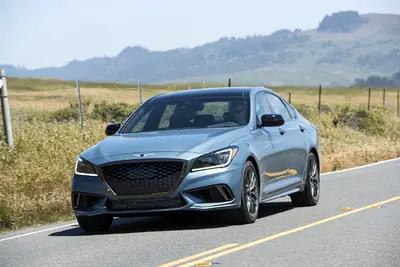2018 Genesis G80 3.3T Sport AWD Review by Carey Russ +VIDEO
Luxury at a value price
DRIVING DOWN THE ROAD WITH CAREY RUSS
• SEE ALSO: Genesis Research and Buyers Guide
 |
Genesis is Hyundai’s upscale division, created at the beginning of the 2017 model year. The cars previously at the top of the Hyundai lineup are the Genesis line, with what was the Genesis sedan becoming the G80 and the Equus morphing into the G90. Wondering where the Genesis Coupe went? Gone, for now. There is something called G70 on the horizon, so stay tuned.
Although plenty of styling cues are shared, all the better for brand recognition, the G80 is smaller than the G90, by about six inches in wheelbase and seven and a half in overall length. Think Lexus GS to LS, or BMW 5 versus 7, Audi A6 against A8, or Mercedes-Benz E compared to S. Some opulence and space, especially in the rear, is traded for a bit more sportiness.
On its debut, the Genesis G80 had two choices for power, a 3.8-liter V6 with 311 horsepower and 293 lb-ft of torque or a 5.0-liter V8 with 420 hp and 383 lb-ft. The G90 debuted with the V8, no surprise — and a 3.3-liter twin-turbo V6 boasting 365 hp and 376 lb-ft. Less maximum horsepower than the V8, but nearly the same torque, with that 376 lb-ft produced between 1300 and 4500 rpm. The V8 peaks at 5000. So a bit less weight between the front wheels and, more importantly, better low- and mid-range torque, which is what counts in real-world driving.
So no great surprise that the 3.3 turbo has found its way into the G80 lineup as the Genesis G80 3.3T Sport. Compared to its stablemates, it’s distinguished outside by dark chrome exterior trim and copper-colored accents on the headlights and its 19-inch alloy wheels. Inside it gets a black microfiber-suede headliner, real carbon-fiber trim, and alloy sport pedals. It also comes with a larger touchscreen and standard navigation, multi-view camera, premium audio, adaptive LED headlights, and Qi wireless mobile device charging. Continuous Damping Control suspension gives a sportier driving experience with no loss of luxury comfort. The other models get freshened exterior styling and a variety of interior changes as well for 2018. All are offered with rear- or all-wheel drive.
This week’s test car is a 2018 G80 3.3T Sport in all-wheel drive form. No options, none offered, none needed. Everything is standard - all that mentioned above plus the full complement of electronic safety aids, a multi-view exterior camera, panoramic sunroof, color heads-up display, and high-quality audio system with Android Auto™ and Apple CarPlay™ compatibility.
All of which makes it a fine example of contemporary mid-luxury sedan, at a very competitive price. I see plenty of examples of the just-previous (Hyundai) Genesis and new standalone G80 on the roads. No surprise there, as even at this price point value is important. The “peacock’s tail” zone is considerably higher… Interestingly, a couple Genesis owners checked out my car very carefully. New cars are usually ignored by owners of the same marque, even new German ones, so I see more owner enthusiasm than expected. On the open road or around town, the Genesis G80 Sport is composed, quiet, and comfortable. It’s more of a luxury sedan with sports looks than a true sports sedan, but that should please far more people than an uncompromising sports sedan, or even a sports-luxury sedan.
APPEARANCE: The G80’s Teutonic-looking styling debuted in 2015, before Genesis was spun off as a separate brand. The defining grille is accented by sharp character lines in the hood and above the headlights, with the winged Genesis emblem above. LED running lights frame the headlights. Exterior trim, including the grille and side windows, is black chrome. The Sport’s lower apron is sportier-looking than that of the regular G80, with functional aero vents outboard. Short overhangs mean that it’s well-protected against scuffing from parking stops or steep driveways, but not impervious. The semi-fastback roofline ends in a short trunk lid with an aerodynamic ducktail at the trailing edge. Wraparound taillights (LED, of course) define the rear, with quad exhausts and a faux venturi panel between them setting a sporty tone.
 |
SAFETY: In addition to its unibody structure designed and built for rigidity and good dispersion of crash energy, the Genesis G80 has nine airbags and pre-active safety belts that automatically tighten under acceleration, braking, or quick maneuvers. Standard electronic systems include everything — Automatic Emergency Braking with Pedestrian Detection, Driver Attention Alert, Blind Spot Detection, Lane Keep Assist, Smart Cruise Control with Stop/Start, front and rear parking sensors as well as a color heads-up display, high-beam assist, and haptic steering wheel. The multi-view backup camera assists in tight spaces and at night.
RIDE AND HANDLING: The G80’s structural rigidity helps its road manners in addition to passive safety, and the accident you can avoid is one you don’t have. Its fully-independent multilink suspension was designed to minimize camber and toe-in changes, for predictable response. The Continuous Damping Control suspension is integrated with the Dynamic Stability Control system. Steering is electrically-assisted, with variable assist. Brakes are vented discs all around, with four-piston calipers in front and single-piston calipers in the rear. Steering, stability control, and damping rates are controlled by the Intelligent Drive Mode switch, with Eco (maximize fuel economy), default, and Sport modes. Default works very well and was what I mostly used. Sport is a bit firmer, but more “luxury sport-touring” with an appropriate emphasis on comfort. With a curb weight around 4700 pounds, inertia prevents nimbleness.
PERFORMANCE: At 3.3 liters / 204 cubic inches, the G80 Sport’s V6 is not an especially large one. But with lightweight aluminum alloy construction, four-valve per cylinder heads, continuously-variable cam phasing, variable-length intake, twin intercooled turbos, and direct fuel injection, it’s a V6 that makes 365 horsepower at 6000 rpm, and more importantly for everyday driving, 376 lb-ft of torque between 1300 and 4500 rpm. Turbo lag is a non-issue, any delay in immediate acceleration is more likely from the transmission downshifting. That transmission is Hyundai/Genesis’s own, an eight-speed multimode automatic with manual shifting ability via paddles behind the steering wheel. Intelligent Drive Mode works here, too, changing throttle response and transmission shift mapping. Eco decreases throttle sensitivity and increases shift points to improve fuel economy. Sport increases throttle sensitivity and suspension damping while decreasing steering assist. Differences are not immense, but are noticeable. Despite only momentarily using Eco, I still got an honest 20 mpg for the week.
CONCLUSIONS: The new 2018 Genesis G80 Sport offers luxury with value.
SPECIFICATIONS
2018 Genesis G80 3.3T Sport AWD
Base Price $ 57,750
Price As Tested $ 58,725
Engine Type aluminum alloy twin- turbocharged DOHC 24-valve V6 with continuously-variable cam phasing and direct fuel injection
Engine Size 3.3 liters / 204 cu. in.
Horsepower 365 @ 6000 rpm
Torque (lb-ft) 376 @ 1300-4500 rpm
Transmission 8-speed multi-mode automatic
Wheelbase / Length 118.5 in. / 196.5 in.
Curb Weight 4674 lbs.
Pounds Per Horsepower 12.8
Fuel Capacity 20.3 gal.
Fuel Requirement 91 octane unleaded premium gasoline for optimum performance. 87 octane unleaded regular permissible with reduced performance
Tires P245/40 R19 94W m+s front, P275/35 R19 96W m+s rear Continental Pro Contact TX
Brakes, front/rear vented disc all around, 4-piston calipers front, single-piston calipers rear ABS, EBD standard
Suspension, front/rear independent multilink / independent multilink
Drivetrain longitudinal front engine, all-wheel drive
PERFORMANCE
EPA Fuel Economy - miles per gallon city / highway / observed 17 / 24 / 20
0 to 60 mph est 5.5 sec
OPTIONS AND CHARGES
Destination Charge $ 975



